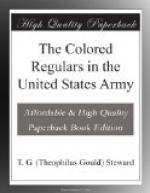A TRIP FROM MONTANA TO CUBA WITH THE TENTH U.S. CAVALRY.
April 16, 1898, at 10.45 p.m., telegram was received from Department Headquarters, St. Paul, Minnesota, ordering the regiment to the Department of the Gulf.
As every click of the telegraph instrument was expected to announce a rupture in the diplomatic relations between the United States and the Kingdom of Spain, all knew that the mobilization of the army South meant preparing it for the serious work for which it is maintained.
On April 19 we were off for Chickamauga Park. En route we were heartily greeted. Patriotism was at its height. Every little hamlet, even, had its offerings. To compare the journey with Caesar’s march of triumph would be putting it mildly.
We arrived at the historic point April 25. Every moment of our stay there was assiduously devoted to organizing, refitting and otherwise preparing for the inevitable. Officers were sent to many parts of the country to secure recruits. Many also gave up details and relinquished their leaves of absence to take part in the impending crisis.
May 14. We were moved a little nearer the probable theatre of operations. On account of some deficiency in water for troops at Tampa, the regiment was stopped at Lakeland, 30 miles this side, where many recruits were received; Troops increased to war strength, and new Troops established. Drills and instructions were also constantly followed up.
June 6. Orders were received to prepare headquarters, band and eight Troops dismounted, with trained men only, for service in Cuba. Recruits to be left in camp with horses and property.
June 7. We were off for Port Tampa, where the regiment embarked on the steamship Leona that afternoon.
June 8. She steamed from the dock. When the expedition seemed to be forming, news was received that the dreaded Spanish fleet was being sighted, evidently lying in wait for army transports. So we steamed back to the pier. Many of the men appeared disappointed at the move, probably not realizing that there was too much water in the Atlantic Ocean for the 5th Army Corps to drink.
To my mind, the Divine Providence surely directed the move, as the delay enabled the force to be swelled several thousand, every one of whom was needed before Santiago.
June 14. We steamed out of Tampa Bay, amid cheers and music from the thirty odd transports, heavily escorted by naval vessels. Among them were the much talked-of dynamiter, Vesuvius, and the beautiful little cruiser, Helena. Off Dry Tortugas that formidable warship, Indiana, joined the fleet.
Splendid weather; nothing unusual transpiring, though our transport, which also contained the First U.S. Cavalry, had a seemingly close call from being sent to the bottom of the sea, or else being taken in as a prisoner, which the enemy could have done with impunity.
Whilst going down the Saint Nicholas Chanel, in Cuban waters, the vessel was deliberately stopped about midnight, June 16, and left to roll in the trough of the sea until the morning of the 17th, in consequence of which we were put 20 hours behind the fleet and without escort, almost in sight of the Cuban shores.




